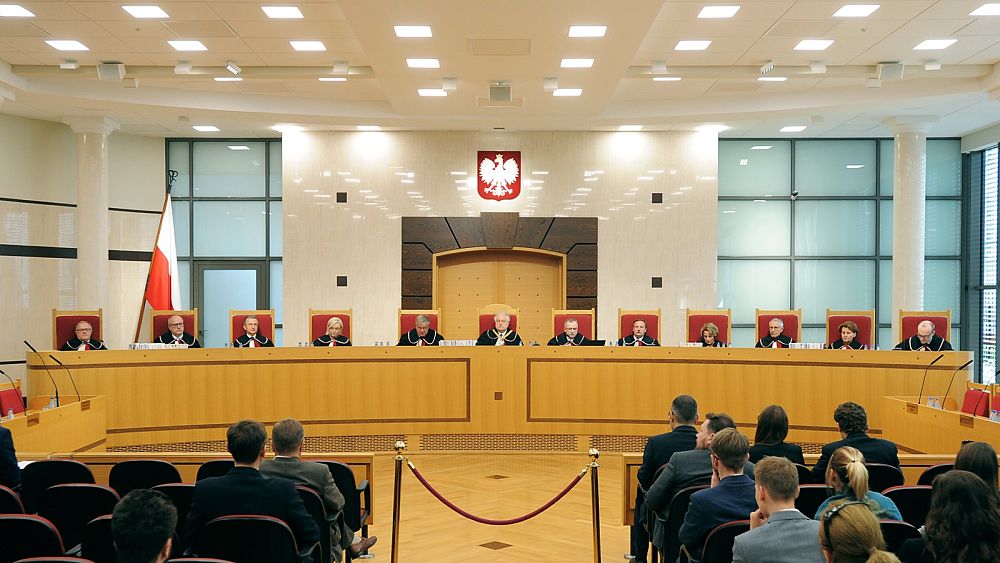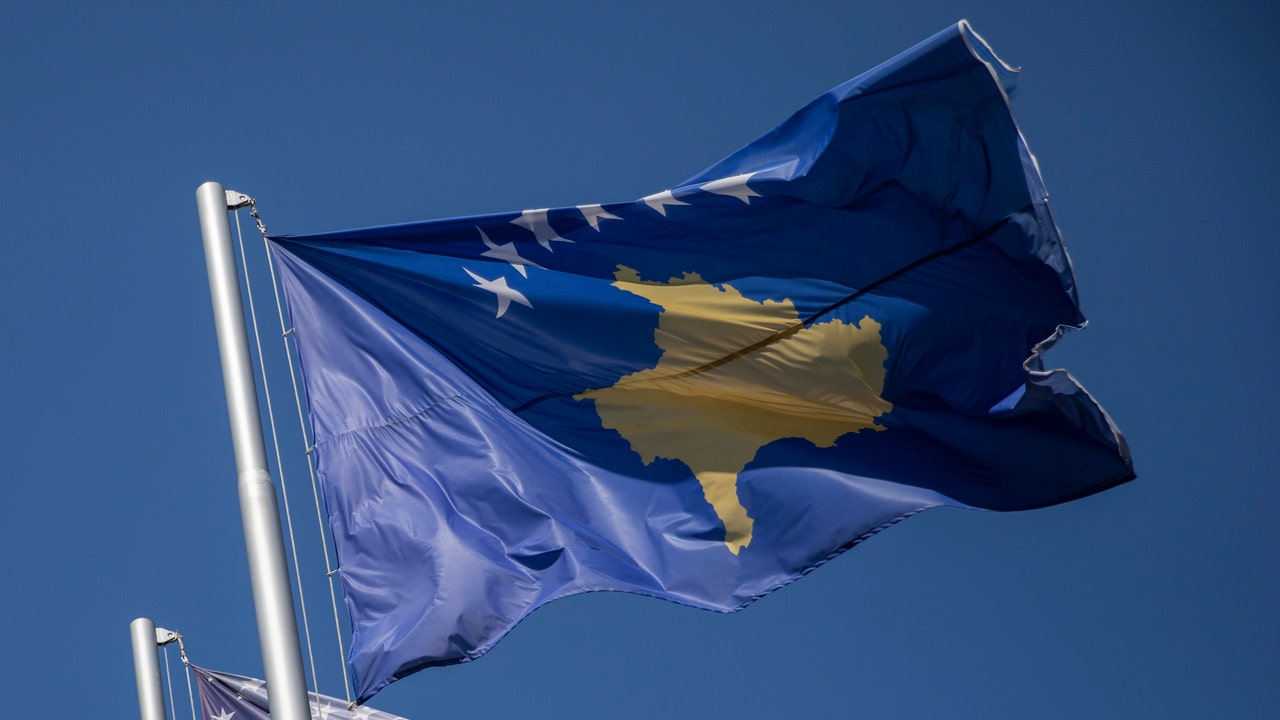World
Poland’s legal overhaul infringes on judicial independence, ECJ rules

The controversial reform has caused an intense and protracted dispute between the Polish government and the European Commission.
Poland’s judicial reform infringes upon European law because it undermines the right to have access to an independent and impartial judiciary, the European Court of Justice (ECJ) has said in a highly-anticipated ruling.
“The value of the rule of law is an integral part of the very identity of the European Union as a common legal order and is given concrete expression in principles containing legally binding obligations for the member states,” the judges said on Monday afternoon.
“The measures thus adopted by the Polish legislature are incompatible with the guarantees of access to an independent and impartial tribunal, previously established by law.”
The ruling is an unambiguous rejection of the reform introduced in 2019 by the hard-right government of the Law and Justice (PiS) party, which sparked an intense dispute between Warsaw and Brussels.
The contentious reform changed the rules that govern the relations between courts, preventing judges from assessing each other’s compliance with EU legal standards and questioning a tribunal’s composition.
It also empowered the disciplinary chamber of the Supreme Court to punish magistrates according to the content of their verdicts. Possible penalties included a reduction of salary, the temporary suspension of duties and the waiver of immunity to allow the initiation of criminal proceedings.
The chamber has been repeatedly criticised by the European Commission, the United Nations and civil society organisations as a political tool to exert control over the judiciary and weaken the separation of powers.
The Commission filed a legal case before the ECJ in March 2021 after its negotiations with the Polish government failed to deliver a satisfying result.
Warsaw struck a defiant tone and insisted the reform was necessary to purge the influence of the communist era, strengthen the apolitical character of the judiciary and crack down on corruption.
The European Court of Justice later ruled the chamber was incompatible with EU law and imposed a series of interim measures and ordered its dismantlement.
Poland’s continued refusal to comply with the interim measures led the ECJ to slap a record-breaking €1 million fine per day on the country, which was reduced to €500,000 a day after the disciplinary body was replaced with a “chamber of professional responsibility.”
The fine is being deducted from Poland’s allocation of the EU budget and ceases to apply as of Monday.
Poland now owes €534 million, according to the European Commission, a sum accrued between October 2021, when the fine was established, and April 2023, when it was downsized.
‘Risks of undue stigmatisation’
In its new ruling, which is final and cannot be appealed, the ECJ offers a total denunciation of Poland’s justice reform law.
The court decries the reform’s “broad and imprecise” provisions and the chilling effect it created on Polish magistrates, who were under threat of retaliation for conducting an effective review of judicial decisions.
The ruling reaffirms the ECJ’s previous position on the chamber’s illegal powers and challenges the obligations related to personal data. Polish judges were required to disclose by writing their affiliation with political parties, civil associations and NGOs.
“The placing online of information relating to past membership of a political party is not, in the present case, appropriate for attaining the alleged objective of strengthening the impartiality of judges,” the judges said.
The disclosure is “liable to expose judges to risks of undue stigmatisation, by unjustifiably affecting the perception of those judges by individuals and the public in general.”
Reacting to the news, Didier Reynders, the European Commissioner for justice, welcomed the ruling and urged the Polish authorities to comply in full.
“Today is an important day for the restoration of an independent justice in Poland,” Reynders said in a short statement. “Any regression on the organisation of justice must be prevented.”
From Warsaw, Zbigniew Ziobro, Poland’s justice minister and one of the key architects behind the reform, expressed his displeasure, saying the ECJ was a “corrupt” tribunal and its decisions were not written by judges “but by politicians.”
Despite its combative rhetoric, the Polish government has already tabled legislation to address the most controversial aspects of the overhaul and secure the release of its €35-billion share of the EU’s COVID-19 recovery fund, which Brussels is currently withholding.
But in February, Polish President Andrzej Duda shocked the country when he chose to send the draft law to the Constitutional Tribunal for a legal review, further delaying its implementation.

World
‘Lone wolf’ or JI?: Jemaah Islamiyah confusion after Malaysia attack

Medan, Indonesia – Malaysia has been the target of a rare deadly attack after a man armed with a machete struck a police station in southern Johor state, killing two police officers and injuring a third.
Initially, Malaysian police said they suspected Friday’s incident was linked to the hardline group Jemaah Islamiyah (JI) and was probably an attempt to steal weapons. Speaking to the media after the attack in the town of Ulu Tiram, Inspector General of Police Razarudin Husain said police raided the suspect’s house and discovered “JI-related paraphernalia”.
Five members of his family were arrested, including the suspect’s 62-year-old father, who police said was a “known JI member”. Two other people, who were in the police station making a report at the time of the attack in the early hours of Friday morning, were also detained.
But on Saturday, Malaysia’s Minister of Home Affairs Saifuddin Nasution Ismail appeared to backtrack on the JI connection, describing the attacker as a “lone wolf” who was “driven by certain motivations based on his own understanding because he rarely mixed with others”.
Former members of JI in Indonesia told Al Jazeera that an attack by the group on Malaysian soil seemed unlikely.
Speaking from prison in Indonesia’s capital Jakarta, where he is serving a life sentence for his role in JI’s 2002 Bali bombing, which killed more than 200 people, Ali Imron told Al Jazeera that JI’s profile in Malaysia did not seem to fit the police station attack.
“There have never been any JI members in Malaysia who agreed to commit acts of violence like this,” he said. “Before the Bali bombing, there were attacks in Malaysia, but these were committed not by JI but Kumpulan Mujahidin Malaysia [KMM].”
KMM, a hardline group linked to JI, carried out small-scale attacks in Malaysia in the early 2000s.
Rueben Dass, a senior analyst at the S Rajaratnam School of International Studies in Singapore, noted that JI had never previously mounted attacks in Malaysia.
“Malaysia was always considered an economic region for JI, not the focus of attacks,” he told Al Jazeera. “The Malaysian authorities were always vigilant and aware, particularly after KMM became active. They have been on their toes and carried out a wave of arrests in the early 2000s of JI members.”
Since then, he said, JI had maintained a low profile.
“To see them coming up again is a little surprising,” he added.
Indonesia, which saw a spate of JI attacks in the late 1990s and early 2000s – including attacks on churches on Christmas Eve 2000, the Bali bombings and the 2003 attack on Jakarta’s JW Marriott Hotel – has also been largely successful in clamping down.
In 2003, with funding and training from the United States and Australia, it established the Counterterrorism Special Detachment 88 (Densus 88), and later set up a National Counterterrorism Agency (BNPT).
Indonesian authorities have also pioneered a range of deradicalisation programmes, using former members of hardline groups including JI, with recidivism rates at about 11 percent, according to the Institute for Policy Analysis of Conflict, a Jakarta-based think tank.
History of JI
JI was founded by Indonesian Muslim scholar Abu Bakar Bashir and Abdullah Sungkar in 1993, with a mission to establish an Islamic caliphate across Southeast Asia.
The group has historically been linked to al-Qaeda, from which it reportedly received funding and training in the 1990s and early 2000s. It has had members in Indonesia, Malaysia, Singapore, Cambodia and the Philippines.
JI was officially banned in Indonesia in 2007, leading to the group splintering. Some members focused on dakwah or proselytisation, while others continued to plot violent attacks. Arrests have continued across the region with members accused of stockpiling weapons and bomb-making equipment.
According to open source data, between 2021 and 2023, out of 610 people arrested In Indonesia, 42 percent were JI and 39 percent were from other hardline groups – including Jamaah Ansharut Daulah (JAD) and other pro-Islamic State groups.
The majority of JI senior figures have been either executed, shot dead in police raids or jailed.
Both Bashir and Sungkar lived in Malaysia in the 1980s and 1990s, in addition to senior members such as Indonesian Encep Nurjaman (alias Hambali) and Malaysians Noordin Mohammed Top and Azahari Husin. Ali Ghufron (alias Mukhlas), Amrozi bin Nurhasyim and Imam Samudra, the masterminds of the Bali bombing, also spent time in Malaysia.
Hambali was arrested in Thailand in 2003 and is currently awaiting trial at Guantanamo Bay in Cuba, while Samudra, Amrozi and Mukhlas were executed in 2008. The two Malaysians were shot in separate police raids in Indonesia in 2005 and 2009.
Before his death, Noordin ran the Luqmanul Hakiem Islamic boarding school in Malaysia, which was founded by Bashir and Sungkar and was in Ulu Tiram, close to the home of the suspect of Friday’s attack.
Malaysia closed the school in 2002 amid suspicions it was being used to recruit people to JI.
Style of attack
While the profile of the suspect’s father, and the proximity to Luqmanul Hakiem, might have suggested a JI connection, Imron cautioned against such an analysis.
“If the son followed his father, there is no way he would have committed this act, so there is a strong possibility that he was inspired by ISIS [ISIL],” Imron said, suggesting the Malaysian authorities had “jumped to that conclusion.”
Umar Patek, who was released from prison in 2022 after serving 11 years of a 20-year sentence for mixing some of the chemicals used in the Bali Bombing, told Al Jazeera that he “did not believe” that the attacker was a member of JI and agreed that the attack appeared to have the hallmarks of another group.
“I am very doubtful,” he said. “I don’t understand it, especially carrying out a violent attack. It is impossible in my view that it was JI, but it is possible that it was ISIS.”
The style of the attack has added to the scepticism, as the targeting of a police station and Muslim police officers is inconsistent with JI’s attacks in Indonesia. There, it has been ISIL-inspired hardline groups, including JAD, that have attacked police stations, seeing them as representative of the state.

Judith Jacob, the head of Asia for the risk analysis and intelligence company Torchlight, told Al Jazeera that the most unusual aspect of Friday’s attack was the location.
“While Malaysian militants have been key figures in JI and Philippine-based groups, there are few indications of sophisticated plots targeting Malaysia specifically in recent years,” she said.
However, while Malaysia and Indonesia have not seen anything like the levels of violence of the early 2000s, attacks have not been completely eradicated – with a pattern of more opportunistic and low-level violence emerging.
“The attack in Malaysia remains squarely within the wheelhouse of regional Islamist militant groups – that is to say, it is a relatively unsophisticated assault,” Jacob said.
“Indonesian groups, in particular, have been largely unable to conduct the large-scale attacks or coordinated bombings that were a hallmark of JI in its heyday in the 2000s. Militant groups in the Philippines are more capable, but they too have been unable to conduct sophisticated bombings beyond the southern islands.”
World
Live Updates: ‘Technical Failure’ Caused Helicopter Crash That Killed Iran’s President, State News Agency Reports
The deaths of Iran’s president, Ebrahim Raisi, and foreign minister left the country without two of its most influential figures at a moment of regional and domestic tumult. Funeral services will be held in three cities from Tuesday through Thursday, the state media said.
World
Denmark turns to Kosovo to alleviate its overcrowded prison system in $217 million deal

Kosovo’s Cabinet renewed efforts with a new draft law on renting a prison in the south of the country to Denmark to help it cope with its overpopulated prison system, an official said Monday.
The first draft of the law failed to pass at the parliament last week. But on Sunday, the Cabinet approved a draft law on 300 cells at the prison in Gjilan, 50 kilometers (30 miles) south of the capital Pristina, to be rented to Denmark, based on a a 10-year agreement that the two governments signed in April and May 2022, government spokesman Perparim Kryeziu said.
FORMER KOSOVO INFRASTRUCTURE MINISTER GETS 44 MONTHS FOR OVERSPENDING ON ROAD PROJECT
“The Cabinet approved it (the draft law) again yesterday (Sunday) so that it passes on to the Assembly (the parliament) to be voted on again,” he said.
An official in Kosovo says the Cabinet has renewed efforts with a new draft law on renting a prison in the south of the country to Denmark to help it cope with its overpopulated prison system. (Photo by Ferdi Limani/Getty Images)
Last week, the draft law got 75 votes, not reaching at least 80, or two-thirds of the 120-seat parliament as required to pass.
Kosovo will be paid 200 million euros ($217 million) that will be spent on the country’s correctional institutions and renewable energy projects.
According to the plan, Denmark won’t be able to send inmates convicted of terrorism or war crimes, or mentally ill prisoners. A Danish warden will run the 300-cell facility, accompanied by an Albanian one and other local staff.
Kosovo’s prison system has a capacity of up to 2,800. It wasn’t immediately possible to find out the current number of vacancies.
Neighboring Albania has agreed to hold thousands of asylum-seekers for Italy.
-

 News1 week ago
News1 week agoSkeletal remains found almost 40 years ago identified as woman who disappeared in 1968
-

 Movie Reviews1 week ago
Movie Reviews1 week ago“Kingdom of the Planet of the Apes”: Disney's New Kingdom is Far From Magical (Movie Review)
-

 World1 week ago
World1 week agoIndia Lok Sabha election 2024 Phase 4: Who votes and what’s at stake?
-

 World1 week ago
World1 week agoUkraine’s military chief admits ‘difficult situation’ in Kharkiv region
-

 Politics1 week ago
Politics1 week agoTales from the trail: The blue states Trump eyes to turn red in November
-

 World1 week ago
World1 week agoBorrell: Spain, Ireland and others could recognise Palestine on 21 May
-

 World1 week ago
World1 week agoCatalans vote in crucial regional election for the separatist movement
-

 Politics1 week ago
Politics1 week agoNorth Dakota gov, former presidential candidate Doug Burgum front and center at Trump New Jersey rally

















